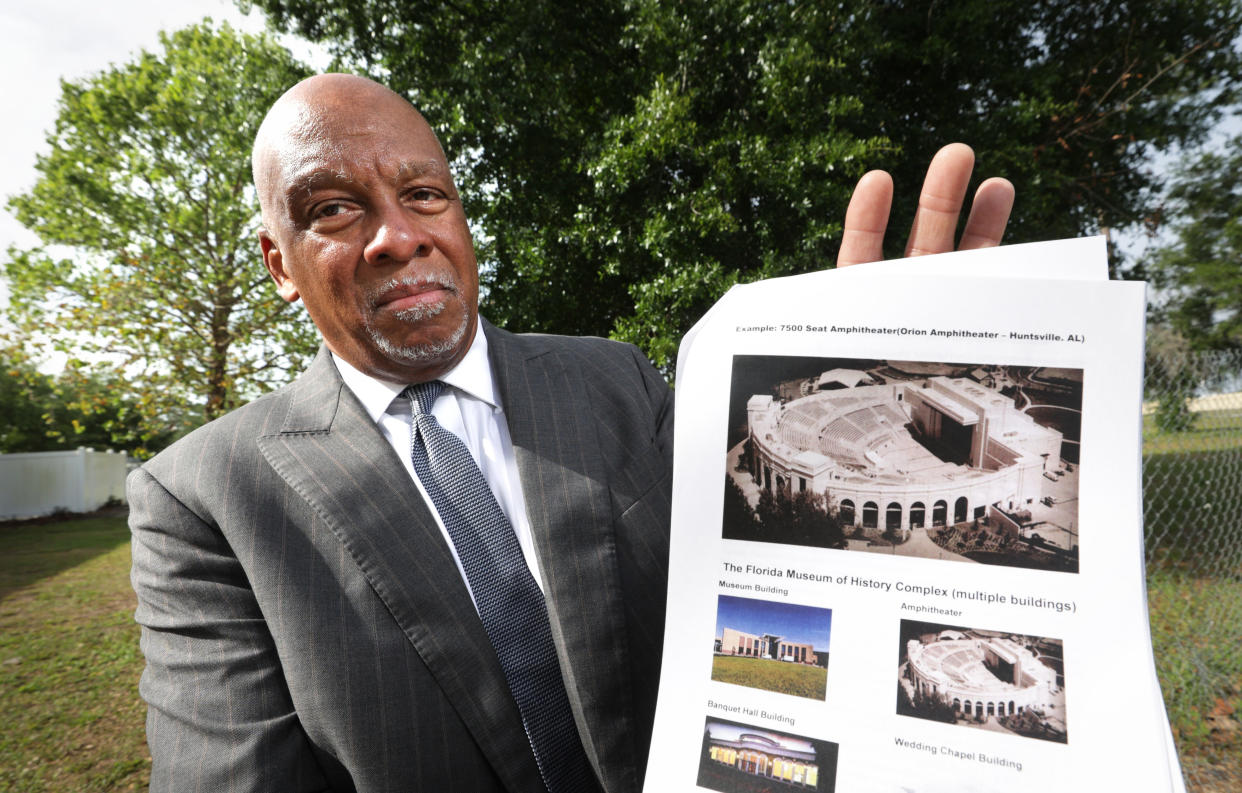Eatonville lost the battle for the Black History museum — but insists it could win the war

- Oops!Something went wrong.Please try again later.
Although the panel vetting sites for the Florida Museum of Black History recommended St. Augustine over Eatonville this week, a big question remains that gives the Orange County town hope it may yet prevail: Who’s going to pay for it?
The nine-member task force picked St. Augustine, and then voted Tuesday for a feasibility study to figure out how to fund construction of the museum, as well as handle its operating expenses.
Supporters of Eatonville, the nation’s oldest incorporated Black municipality, say its proximity to Orlando’s throng of tourists positions it better for success than the quaint beach community 100 miles away.
“I’m standing here, really puzzled and confused, by what we’re doing,” said state Rep. Bruce Antone, the Orlando Democrat who drafted the legislation to create the museum and has been an outspoken advocate for Eatonville
He suggested the panel’s vote for a feasibility study “means you don’t know if it’s gonna work” in St. Johns County, which had about 3 million visitors from July 2021 to June 2022 according to its visitors and convention bureau, compared to 74 million in Orange County in about the same period
Antone said Eatonville can expect a favorable lease for its 10-acre site, owned by Orange County Public Schools, and draw on a local coalition of donors and tourist-tax revenue to help pay to build the 100,000-square-foot museum, estimated to cost at least $100 million.
The venue he envisions would draw 500,000 visitors a year.
In contrast, one supporter of the St. Augustine site on the task force hinted a museum there might need lots of help from the state. “If the state would like to fully fund their museum, I wouldn’t stand in their way,” said Tony Lee, an assistant vice chancellor with the state university system, near the end of the Tuesday meeting.
Feasibility and sustainability studies provide important information for choosing a location, said Nashid Madyun, a task force member, executive director of Florida Humanities and former museum director at Hampton University, a historically Black school in Virginia.
“We need to make sure that once the doors are open, they can stay open,” he said.
Madyun had ranked Eatonville one point better than St. Augustine.
Signaling its decision may not be final, the panel on Tuesday asked for feasibility studies of three sites, adding Eatonville and Opa Locka in Miami-Dade County, its third-ranked proposal.
St. Augustine advocates say they have access to more resources than may be apparent. They have lined up the support of nonprofits, including the Community Foundation of Northeast Florida and the Jaguars Foundation; three historically Black colleges and universities, and neighboring Nassau, Duval, Clay and Flagler counties.
“This is not just a St. Johns County museum,” said Sarah Arnold, chair of the county commissioners, lauding the region’s success in historical tourism. “It is, in fact, a hub-and-spoke, regional asset that will benefit not only northeast Florida but the entire state.”
In April, task force members had scored competing sites according to seven criteria, including historical significance and “appropriateness of location,” then averaged those scores. Eatonville ranked highest with five of the nine task force members, but its averaged score was just behind St. Augustine, in large part because one member, Rep. Kiyan Michael, handed St. Augustine a perfect score and Eatonville its lowest marks, with a gap of 32 points.
The Jacksonville Beach Republican was appointed to the panel by Speaker of the House Paul Renner, whose district includes St. Johns County. She said at the meeting she didn’t believe she had to justify her scores and described scrutiny of her evaluations as “bullying.”
The panel had been expected Tuesday to whittle its four finalists, which also included Sarasota, to two.
But instead the panel voted, 5-4, to let its averaged rankings from April stand as its recommendation. That handed the win to St. Augustine.
The surprise swing vote on Tuesday was state Rep. Berny Jacques, a Republican from Pinellas County appointed to the task force by Gov. Ron DeSantis. Last month, Jacques scored both Eatonville and Opa Locka 15 points better than St. Augustine. But then he backed the proposal that put St. Augustine at the top — the only member of the panel to, in effect, switch his preference.
Jacques did not return calls, emails or texts seeking an explanation.
Despite the panel’s recommendation Tuesday, Eatonville advocates insist their window of opportunity remains open.
“We’re hopeful an unbiased study will show what’s really possible and what’s not,” said Demetris Pressley, Eatonville’s Chief Administrative Officer. “There’s still a chance.”
The task force is scheduled to meet twice more in June, and has a July 1 deadline to deliver its recommendations. The legislation requires it to draft a transition plan for the museum to become financially self sufficient — and give that to the governor and legislators.
State Sen. Geraldine Thompson, a Windermere Democrat who led the task force, blamed politics for muddying the group’s decision. But she saw a silver lining in the controversy, saying she is encouraged by the attention the museum has generated.
“If nothing else, I think this has heightened the interest of people in African-American history and made it clear that we have not celebrated it or elevated it to the point we should have,” she said.

